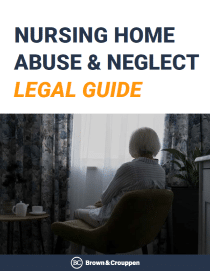
Use our guide learn how to handle nursing home abuse and neglect, along with key legal considerations and insights.
Why Choose the Nursing Home Infections Lawyers at Brown & Crouppen?
When seeking justice for a loved one suffering from sepsis, securing high-quality legal representation is key. Your attorney should have extensive experience handling nursing home abuse and neglect cases. They should also be someone you feel comfortable discussing the sensitive details of your case with.
The best way to ensure you choose an attorney with the skills, expertise, and resources necessary to handle your case is to ask lots of questions in a free consultation. Our award-winning attorneys have decades of experience representing nursing home abuse and neglect victims. We are standing by to address all of your questions and concerns in a free, no-obligation case review. We invite you to schedule yours today.
Case Results
Over the years, our law firm has developed a strong reputation for achieving high-value settlements and verdicts for our clients. Below are just a few case results we have achieved in cases against nursing homes:
- $1 Million Wrongful Death Settlement – Our client’s mother suffered burns in an altercation at the care facility, which resulted in hospitalization and eventual death.
- $500,000 Wrongful Death Settlement – Our client’s mother experienced negligent care by facility staff, which caused severe injuries due to Stage 4 Bedsores. Life support was terminated as a result.
- $200,000 Neglect Settlement – A nursing home facility failed to treat a bed bug infestation, which resulted in our client suffering significant discomfort and injuries.
How To Sue a Nursing Home for Sepsis
Again, sepsis is an extreme reaction to widespread infection throughout the body, and sepsis in nursing homes is more common than you may think. According to the CDC, “one in three people who die in a hospital had sepsis during that hospitalization.”
A successful nursing home sepsis lawsuit normally requires proving negligence based on failure to provide appropriate medical care. These cases are normally brought under Missouri’s medical malpractice statute, which creates a cause of action for personal injury or death resulting from “rendering of or failure to render health care services.”
To successfully bring a medical malpractice lawsuit, you need to show that the nursing home failed to provide a minimum standard of care. Further, plaintiffs must file an affidavit with the court showing that they obtained the written opinion of a “legally qualified health care provider” stating that the:
- Nursing home failed to provide the “reasonably prudent” care that another provider “would have under similar circumstances.”
- Failure to provide reasonable care directly caused or directly contributed to the victim’s sepsis.
Satisfying these requirements can be an uphill battle without the help of an experienced nursing home infections lawyer. Fortunately, you do not have to fight the battle alone. Our skilled legal team is standing by to investigate your case, gather all available evidence, and build a strong claim on your behalf.
Damages Available in a Nursing Home Sepsis Lawsuit
You may be eligible to recover compensation for economic and non-economic damages through a nursing home sepsis lawsuit. Economic damages compensate for tangible monetary losses, including medical bills and long-term care needs.
Non-economic damages compensate for the subjective aspects of your injuries and losses, including physical pain and suffering, emotional trauma, and long-term disability. Importantly, Missouri caps non-economic damages in medical malpractice claims. The current caps are set at $400,000 for “non-catastrophic injuries” and $700,000 for “catastrophic injuries,” which include:
- Quadriplegia
- Paraplegia
- Loss of two or more limbs
- Significant and permanent cognitive impairment
- Irreversible failure of a major organ
- Significant loss of vision
"When someone is injured, most people automatically think they're going to get their medical bills and out-of-pocket expenses back, but really, it's so much more than that. . . . Getting full justice means not only recovering those out-of-pocket expenses but also things that are intangible and really affect your day-to-day interactions with people you love."
– Andrea McNairy, Partner
Statute of Limitation for a Missouri Nursing Home Sepsis Lawsuit
The deadline set by the Missouri medical malpractice statute of limitations is generally two years from the date the malpractice occurred. However, the deadline can vary based on the specific circumstances of your case. For example, the continuing care exception and failure-to-inform exception may extend the filing deadline.
In all cases, failing to file your claim before the correct statute of limitations expires will result in it being dismissed in court. Therefore, it is essential to consult with an experienced attorney as soon as possible if you believe you have a viable legal claim. Do not wait to have your case reviewed by our skilled nursing home abuse and neglect attorneys. We are here to help.
"The advice I would give to someone who has a loved one in a nursing home facility who they suspect has been harmed is to call a lawyer. Let the lawyer determine whether or not it is something they need help with. Because, sometimes, you just don't know, and I'd rather err on the side of you calling. It's always free to call us and have us give you our best analysis of what's going on and how to handle that situation."
– Andy Crouppen, Managing Partner
How Can Nursing Home Negligence Lead to Sepsis?
Understanding how to identify signs of nursing home neglect and abuse is crucial for protecting vulnerable residents. Many forms of nursing home medical negligence can lead to sepsis. Below are some common forms of negligence that can give rise to a nursing home sepsis lawsuit:
Poor Infection Control
Failure to maintain a sterile environment can lead to infections that ultimately result in sepsis. Improper sterilization of medical equipment and poor hygiene practices among staff can expose vulnerable residents to harmful pathogens. Poorly trained staff may also fail to promptly identify and treat infections, increasing the risk of sepsis. Nursing home staff should be trained to recognize early signs of infections to avoid delaying essential treatment.
Failure To Treat Wounds
Improper wound care can also lead to sepsis. When negligent nursing home staff allow wounds to fester, residents can contract serious infections. Regular assessments are crucial to ensure timely treatment of infections. Untreated wounds, such as bedsores, can rapidly lead to sepsis once they become infected. Wound treatment is a basic medical service that should never be denied in nursing homes.
Misdiagnosis
Because sepsis spreads rapidly after initial onset, it is essential that nursing home staff identify it as soon as possible. A misdiagnosis of initial symptoms can significantly impact a resident’s chance of recovery. Misdiagnosis can occur when nursing home staff ignores early signs of infection, misattributes symptoms to less severe ailments, fails to seek timely advice from medical experts, or does not administer correct medication to combat infection.
Steps To Take If You Suspect Negligence in Nursing Homes
If you suspect nursing home abuse or neglect caused your loved one’s sepsis, taking immediate action is essential. Here’s what you need to do to address the situation and protect their rights:
- Seek medical attention – If you suspect your loved one developed sepsis in a nursing home, seek immediate medical help. The faster sepsis is treated, the better the chances of recovery.
- Report your concerns – Report the abuse or neglect to the appropriate authorities and keep a record of your report for future reference. The report may lead to a formal investigation, which can generate important evidence for your case. Our legal team can help you file an official report.
- Collect evidence – Gather all medical records, notes, and any communication related to the care of your loved one. Visual documentation of nursing home conditions, visible injuries, and signs of neglect can also turn the tide of a case.
- Keep a detailed health log – Record all symptoms, treatments, and medical interactions. Your loved one’s official medical records will also become essential evidence. A comprehensive medical evaluation and meticulous documentation are foundational for building a strong case.
- Gather witness testimony – Gather statements from anyone who might have witnessed the neglect, abuse, or substandard care. Note the names and contact information of potential witnesses in your case.
- Keep communication records – Save all emails, texts, and notes from conversations with nursing home staff and administrators.
- Consult our nursing home infections lawyer – Our experienced nursing home abuse and neglect lawyers are here to ensure you know your rights and guide you down the path toward justice and compensation.
Taking Action Against Nursing Home Negligence
Understanding your legal rights is imperative if your loved one develops sepsis due to nursing home abuse or neglect. At Brown & Crouppen, we are dedicated to serving our community by providing accessible, high-quality legal representation to the most vulnerable members of our society. Our attorneys are here to help.
To schedule your free consultation and explore your legal options, call (800) 536-4357 or contact us online. We are committed to helping you secure the justice, accountability, and compensation your loved one deserves. Because we operate on a contingency basis, you pay nothing unless we win your case.








